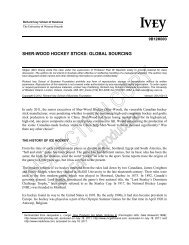foundation of canada asia pacific - Content Tagged with
foundation of canada asia pacific - Content Tagged with
foundation of canada asia pacific - Content Tagged with
Create successful ePaper yourself
Turn your PDF publications into a flip-book with our unique Google optimized e-Paper software.
60<br />
Responsibility for Canada’s international relations rests primarily <strong>with</strong> the Department <strong>of</strong><br />
Foreign Affairs and International Trade (DFAIT). The Canadian International Development<br />
Agency (CIDA) is responsible for the administration <strong>of</strong> ODA. CIDA focuses Canada’s<br />
ODA on the alleviation <strong>of</strong> poverty and the promotion <strong>of</strong> sustainable development,<br />
following a number <strong>of</strong> priorities: the provision <strong>of</strong> basic human needs (like primary health<br />
care, education, water, sanitation and shelter); full participation <strong>of</strong> women in society;<br />
development <strong>of</strong> democracy and good governance; promotion <strong>of</strong> a healthy private business<br />
sector; provision <strong>of</strong> sustainable infrastructure services; and protection <strong>of</strong> the environment.<br />
Canada seeks little direct return for its participation. “Benefit to Canada,” though<br />
nominally a factor in designing ODA projects, has been pursued less than vigorously and<br />
<strong>of</strong>ten <strong>with</strong> some embarrassment by CIDA <strong>of</strong>ficials. Other government departments have<br />
not shown such inhibition. In the past decade, these agencies have become involved in<br />
international cooperation areas that call for solutions more complex than the traditional<br />
donor-recipient model, usually <strong>with</strong> a spin-<strong>of</strong>f benefit to Canada. There is a need to<br />
recognize and coordinate this type <strong>of</strong> assistance <strong>with</strong> Canada’s overall ODA effort.<br />
THE “NEW” ODA<br />
The need for traditional ODA to provide for the basic human needs <strong>of</strong> the 900 million<br />
people in Asia who live in poverty 1 is perhaps greater now than it was at the start <strong>of</strong> the<br />
decade. The Asian economic crisis in Indonesia and Thailand, plus population growth<br />
in the Philippines, India, Pakistan and Bangladesh, have only exacerbated an already<br />
unacceptable situation. In recognition <strong>of</strong> this, CIDA, along <strong>with</strong> such organizations as<br />
the Asian Development Bank and the World Bank, has adopted poverty reduction as its<br />
overarching objective. But the need for “new” ODA is bound to grow too as globalization<br />
advances. In Asia Pacific, economic integration has created the biggest demand for<br />
regional public goods, a demand that traditional ODA cannot, and was not designed to,<br />
meet. The range <strong>of</strong> projects is extremely diverse. It includes such areas as control <strong>of</strong> crossborder<br />
pollution, common product quality standards, financial market regulation and<br />
stabilization, and law enforcement. One <strong>of</strong> the lesser known aspects <strong>of</strong> APEC is its work<br />
addressing some <strong>of</strong> these needs through its trade facilitation and its economic and<br />
technical cooperation activities — albeit in a haphazard and as yet half-hearted manner.<br />
Canada is active in APEC working groups and committees involved in projects aimed<br />
at harmonization <strong>of</strong> customs procedures, financial market regulation, development <strong>of</strong><br />
fish inspection systems, and aviation and maritime safety. We regularly send experts<br />
from the relevant government departments (as well as from the private sector) to these<br />
working groups and committees, at the expense <strong>of</strong> Canadian taxpayers.<br />
It may be hard to identify how a specific developing country benefits from Canada’s<br />
participation in a certain working group. However, all participating developing countries<br />
stand to benefit from the successful provision <strong>of</strong> a regional public good such as common<br />
product standards or cooperation in financial market monitoring. 2 Not only developing<br />
countries but all participants in a regional exercise can benefit, which is <strong>of</strong> course their<br />
reason for participating in the first place. That is a problem for traditionalists who are<br />
unable to identify the donor or the recipient in these types <strong>of</strong> projects. In fact, there is<br />
no real distinction. Among Asian developing economies there is resistance to the use <strong>of</strong>



